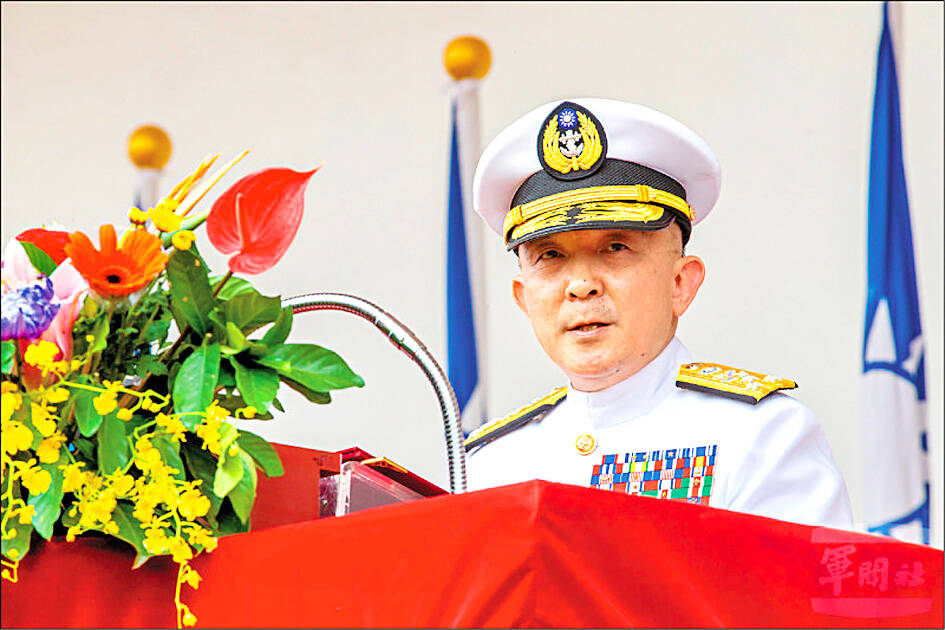China’s authoritarian expansionism threatens not only Taiwan, but the rules-based international order, the navy said yesterday, after its top commander said in an interview that the Chinese People’s Liberation Army (PLA) could blockade the nation at will.
The object of Beijing’s expansionist activities is not limited to Taiwan and its use of pressure is not confined to specific political groups or people, the navy said in a statement.
China utilizes a mixture of cognitive warfare and “gray zone” military activities to pressure Taiwan, the navy said, adding that PLA sea and air forces are compressing the nation’s defensive depth.

Photo courtesy of the Military News Agency
The navy continues to counter Chinese actions by using its forces flexibly and integrating reconnaissance assets to ensure constant surveillance and quick reactions, it said.
The military closely watches the development of new tactics by the Chinese and takes prompt countermeasures to defend the nation’s sovereign waters, it said.
Navy Commander Admiral Tang Hua (唐華) on Thursday said in an interview with The Economist that the PLA is enacting an “anaconda strategy” to subdue Taiwan and that the nation’s armed forces are being stretched thin.
The Chinese military is “slowly, but surely” increasing its presence around Taiwan proper, he was quoted by the magazine as saying.
“They are ready to blockade Taiwan at any time they want,” he said.
PLA air incursions across the Taiwan Strait’s median line surged five times from 36 in January to 193 last month, and Chinese ships operating near Taiwanese waters have doubled from 142 to 282 during the same period, he said.
Chinese ships have moved closer to Taiwan and sail along the nation’s contiguous zone, or 24 nautical miles (44km) from shore, patrolling for days at a time, Tang said.
Citing Taiwanese analysts Ma Cheng-kun (馬振坤) and Tristan Tan, The Economist said the Taiwanese navy is deploying 25 percent to 50 percent of its combat strength to match PLA patrols.
“They give you extreme pressure, pressure, pressure. They’re trying to exhaust you,” Tang said, adding that a government audit found that more than half of Taiwanese principal combatants have fallen behind schedule on maintenance.
Most Taiwanese are unaware of PLA patrols’ proximity and regularity, as government updates on Chinese military activities do not identify warship types, their designation or the duration of their presence, Tang said.
The government could be worried that disclosure could harm Taiwanese morale or the economy, he was paraphrased as saying.
The navy is focused on avoiding confrontation as the PLA inches closer to the nation, because Beijing’s goal is to “force Taiwan to make mistakes,” Tang said, adding that mishaps could serve as “excuses” for launching a blockade.
The military this year issued new rules of engagement that legally and morally define the justifiable use of force, he said.
“We restrain our guys not to provoke or escalate,” he added.
The PLA has 10 times as many destroyers as Taiwan and twice as many frigates, The Economist said.

AIR SUPPORT: The Ministry of National Defense thanked the US for the delivery, adding that it was an indicator of the White House’s commitment to the Taiwan Relations Act Deputy Minister of National Defense Po Horng-huei (柏鴻輝) and Representative to the US Alexander Yui on Friday attended a delivery ceremony for the first of Taiwan’s long-awaited 66 F-16C/D Block 70 jets at a Lockheed Martin Corp factory in Greenville, South Carolina. “We are so proud to be the global home of the F-16 and to support Taiwan’s air defense capabilities,” US Representative William Timmons wrote on X, alongside a photograph of Taiwanese and US officials at the event. The F-16C/D Block 70 jets Taiwan ordered have the same capabilities as aircraft that had been upgraded to F-16Vs. The batch of Lockheed Martin

GRIDLOCK: The National Fire Agency’s Special Search and Rescue team is on standby to travel to the countries to help out with the rescue effort A powerful earthquake rocked Myanmar and neighboring Thailand yesterday, killing at least three people in Bangkok and burying dozens when a high-rise building under construction collapsed. Footage shared on social media from Myanmar’s second-largest city showed widespread destruction, raising fears that many were trapped under the rubble or killed. The magnitude 7.7 earthquake, with an epicenter near Mandalay in Myanmar, struck at midday and was followed by a strong magnitude 6.4 aftershock. The extent of death, injury and destruction — especially in Myanmar, which is embroiled in a civil war and where information is tightly controlled at the best of times —

Taiwan was ranked the fourth-safest country in the world with a score of 82.9, trailing only Andorra, the United Arab Emirates and Qatar in Numbeo’s Safety Index by Country report. Taiwan’s score improved by 0.1 points compared with last year’s mid-year report, which had Taiwan fourth with a score of 82.8. However, both scores were lower than in last year’s first review, when Taiwan scored 83.3, and are a long way from when Taiwan was named the second-safest country in the world in 2021, scoring 84.8. Taiwan ranked higher than Singapore in ninth with a score of 77.4 and Japan in 10th with

SECURITY RISK: If there is a conflict between China and Taiwan, ‘there would likely be significant consequences to global economic and security interests,’ it said China remains the top military and cyber threat to the US and continues to make progress on capabilities to seize Taiwan, a report by US intelligence agencies said on Tuesday. The report provides an overview of the “collective insights” of top US intelligence agencies about the security threats to the US posed by foreign nations and criminal organizations. In its Annual Threat Assessment, the agencies divided threats facing the US into two broad categories, “nonstate transnational criminals and terrorists” and “major state actors,” with China, Russia, Iran and North Korea named. Of those countries, “China presents the most comprehensive and robust military threat